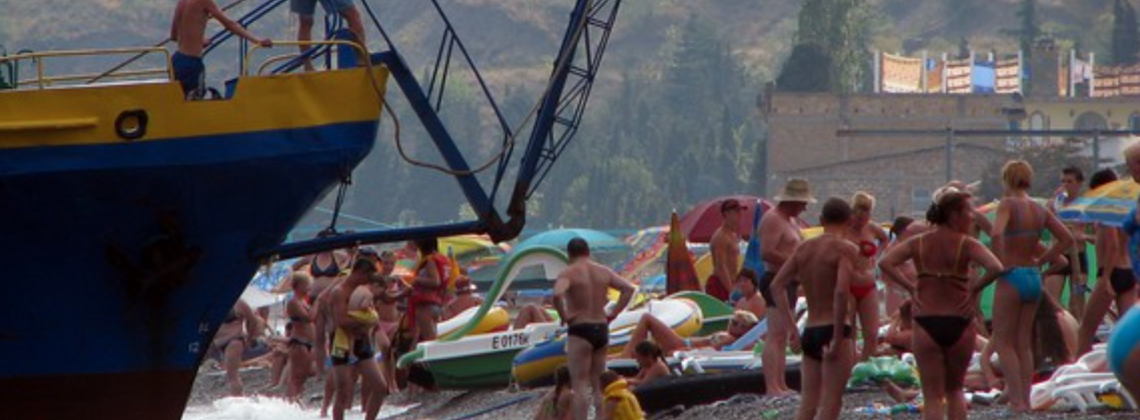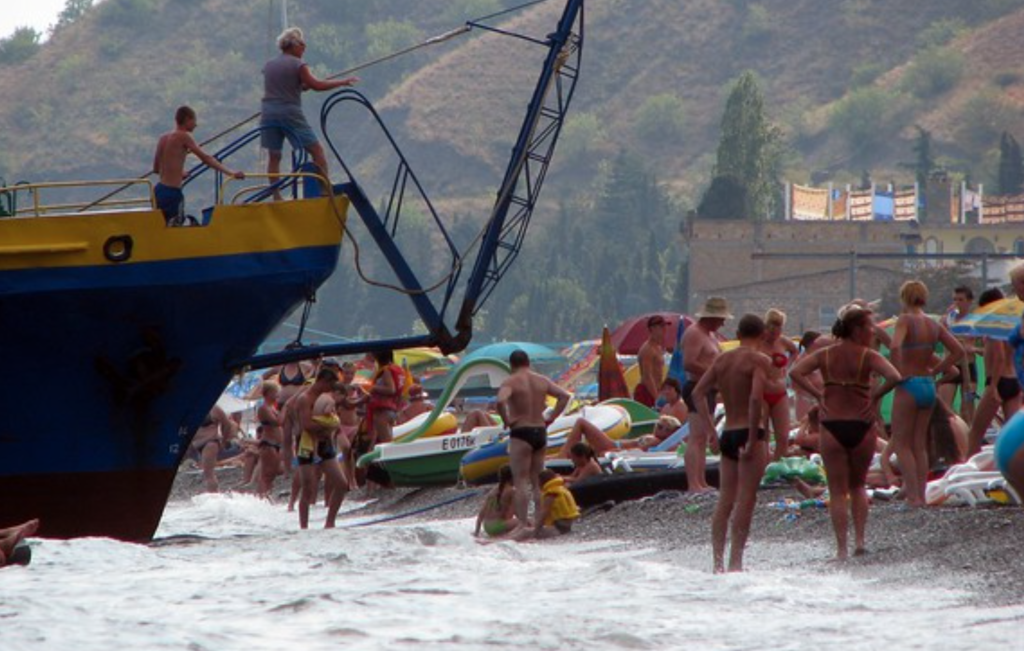

Nostalgia’s inevitable allure, even amid crumbling worlds
In 1998 a group of popular bards of the former Soviet Union collaborated on an ambitious project: “The Songs of Our Century.” A strange name, perhaps. This was, after all, the century that saw Communism founded and then dismantled. Besides, some of the bards were marked as dissidents under the old regime, their music officially banned for a time.
And yet, nostalgia is complicated, and this project was buoyed wholly by it. Love or hate it, this was “our century” for those who lived through any significant part of it. It seemed fitting to say goodbye to it in song. My own parents, members of the same generation as many of these bards, obtained a copy of the CD, which I too know by heart.
Included in the project is Yuliy Kim’s ode to the quintessential Soviet dream vacation: a trip to the Black Sea (although by the time the project formed, Kim himself had immigrated to Israel and didn’t join the rest of the group for the performances and recordings). It seems incongruous now to hear them singing in unison these idyllic memories of the epic vacations of their long-gone collective (and collectivized) Soviet youth, camping on the beach à la “savages,” as the expression went. The live concert recording shows rapt audience members singing along, the lyrics so heart-tugging in their familiarity:
Wonderful sea, the Black Sea,
Oh, this shine and splash of the nearby wave . . .
Just leave for me if only a drop of shade,
A cool beer and this hot day.
Oh, I remember the Black Sea, that wonderful sea. In July 1989, the summer after I finished first grade, my family vacationed there. Months in advance my dad had to apply through his work for a spot at this resort. As with all things under Communism, it wasn’t terribly expensive, but acceptance was not guaranteed. My parents were overjoyed to be approved. And so we took the train from Leningrad to the Soviet Republic of Georgia, where we were to stay at a Black Sea resort for two weeks.
If the word “resort” brings to mind tiny one-room shacks for each family with no running water, low cots on the earthen floor, bathrooms and outdoor showers almost a kilometer away, and an outside communal area for cooking, the image you’ve formed is correct. This was a camping ground equipped for regular Soviet families like mine, who were used to bringing all supplies with them on trips, cooking all their meals, and spending every waking hour at the beach. The closest town was some distance away. If you forgot to pack something essential, you figured out how to do without.
To be fair, our family vacations normally involved camping in the deep woods by a lake somewhere, far from any trace of civilization, where enthusiastic mosquitoes would eat you alive, and where the pike and trout (and other fish whose English names I don’t know) grew to epic proportions, undisturbed by human visitors. A competitive fly-fisherman in his youth, my dad assumed vacations were an excuse to catch as much as possible of your own food instead of packing it. Long after leaving Russia, my parents’ idea of a vacation still involved camping with zero amenities—except access to a fishing stream. In a zombie apocalypse, I suspect they would do just fine.
I can imagine my dad’s disappointment over a fishing-free vacation that summer. To the rest of the family, however, this resort seemed like a significant upgrade. I recall spending a lot of time playing on the beach with my brother. But the most memorable part of this vacation was how it ended.
This was, after all, 1989—even as those of us living through it did not, perhaps, understand what this meant. The Iron Curtain was in the process of collapse. Revolutions in Communist countries all over Europe were brewing, about to erupt in earnest that fall. The Berlin Wall would come down that November. In hindsight, the political situation in Georgia over that summer fits into this larger pattern of rejecting Communism and seeking independence.
While we and thousands of other campers were enjoying the perks of state-permitted vacations on the same seashore where over two-and-a-half millennia ago Greeks from Miletus founded a trading colony, the nearby city of Sukhumi experienced a deadly protest on July 16. The long-simmering tensions between ethnic Abkhaz and the larger state of Georgia, which refused to grant them independence, came to a head with riots and violence in the streets. A full-scale war loomed.
We saw none of this firsthand, but the resort compound began to empty out. Initially my parents were determined to stick it out. This was a once-in-a-lifetime kind of vacation after all! At last, for some reason they changed their mind (was the camp just shut down?), and we left a few days early. By then train travel was not safe. Instead, we flew back to Leningrad.
This was my first time on a plane, and it seemed all right. It was also my first time to chew gum—on Soviet planes, passengers were handed little squares of chewing gum to ease the experience of ears popping from altitude changes on takeoff and landing. It’s funny to think that the next time I was on a plane, in 1991, it was in one that landed in Tel Aviv—when my family departed Russia forever.
But what happened in Sukhumi? In retrospect, that summer offered harbingers of the coming collapse of the Soviet Union and the violence that would intensify afterwards. Indeed, the ethnic tensions in Abkhazia continued and only worsened after the dissolution of USSR in 1991. The Abkhaz war for independence from Georgia culminated in a massacre in Sukhumi in 1993—an ethnic cleansing of Georgians in the city and the surrounding region. This war did ultimately gain Abkhazia its independence from Georgia—and Russia’s protection, if one wants to call it that.
I wonder what Russian tourists think of this history today, as they visit these now gentrified beaches in droves every summer. But perhaps the dream vacation on the Black Sea was always a game of make-believe. Surely Yuliy Kim knew this—the son of parents declared Enemies of the People under Stalin’s Great Purge of the 1930s, he never went to the Black Sea for childhood vacations.
And yet, in our hearts, so easily seduced and captivated by nostalgia for all the lovely things we never experienced but nevertheless believe could and should happen to us, we desire to hold on to these dreams of that perfect seaside vacation—the one that is just visible on the edge of our imagination, if only in our most optimistic moments. I mean those fleeting seconds when we also think that maybe peace on earth could truly exist, that innocents will no longer suffer despite the widening gyre, and that a beach could be glorious and perfect, without the possibility of skin-peeling sunburn or stinging jellyfish or a sun so bright it gives you a migraine.
Except, I am now old enough to know that none of this is possible in this life.
But perhaps it is best just to believe that whatever it was, it was perfect. And so, I too can still sing along:
On a plane or in a train passenger coach,
Oh, you cannot not return here.
Nadya Williams is the author of Cultural Christians in the Early Church (Zondervan Academic, 2023) and Mothers, Children, and the Body Politic: Ancient Christianity and the Recovery of Human Dignity (forthcoming, IVP Academic, October 2024). She is Contributing Editor for Providence Magazine and Front Porch Republic, and Book Review Editor for Current, where she also edits The Arena blog.
Thank you for this. Listening to “Чёрное море” now– I didn’t know about this singer, but now I’m sure I’ve heard him before.
The moment that got me the most in your story: “It’s funny to think that the next time I was on a plane, in 1991…” Talk about cataclysmic years for…flight.